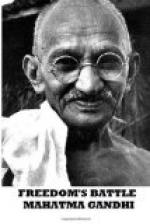The uplands of East Africa have been declared a Colony and the lowlands a Protectorate. There is a sinister significance attached to the declaration. The Colonial system gives the Europeans larger powers. It will tax all the resources of the Government of India to prevent the healthy uplands from becoming a whiteman’s preserve and the Indians from being relegated to the swampy lowlands.
The question of franchise will soon become a burning one. It will be suicidal to divide the electorate or to appoint Indians by nomination. There must be one general electoral roll applying the same qualifications to all the voters. This principle, as Mr. Andrews reminded the meeting, had worked well at the Cape.
The second part of the East African resolution shows the condition of our countrymen in the late German East Africa. Indian soldiers fought there and now the position of Indians is worse than under German rule. H.H. the Agakhan suggested that German East Africa should be administered from India. Sir Theodore Morison would have couped up all Indians in German East Africa. The result was that both the proposals went by the board and the expected has happened. The greed of the English speculator has prevailed and he is trying to squeeze out the Indian. What will the Government of India protect? Has it the will to do so? Is not India itself being exploited? Mr. Jehangir Petit recalled the late Mr. Gokhale’s views that we were not to expect a full satisfaction regarding the status of our countrymen across the seas until we had put our own house in order. Helots in our own country, how could we do better outside? Mr. Petit wants systematic and severe retaliation. In my opinion, retaliation is a double-edged weapon. It does not fail to hurt the user if it also hurts the party against whom it is used. And who is to give effect to retaliation? It is too much to expect an English Government to adopt effective retaliation against their own people. They will expostulate, they will remonstrate, but they will not go to war with their own Colonies. For the logical outcome of retaliation must mean war, if retaliation will not answer.
Let us face the facts frankly. The problem is difficult alike for Englishmen and for us. The Englishmen and Indians do not agree in the Colonies. The Englishmen do not want us where they can live. Their civilisation is different from ours. The two cannot coalesce until there is mutual respect. The Englishman considers himself to belong to the ruling race. The Indian struggles to think that he does not belong to the subject race and in the very act of thinking admits his subjection. We must then attain equality at home before we can make any real impression abroad.
This is not to say that we must not strive to do better abroad whilst we are ill at ease in our own home. We must preserve, we must help our countrymen who have settled outside India. Only if we recognise the true situation, we and our countrymen abroad will learn to be patient and know that our chief energy must be concentrated on a betterment of our position at home. If we can raise our status here to that of equal partners not in name but in reality so that every Indian might feel it, all else must follow as a matter of course.




